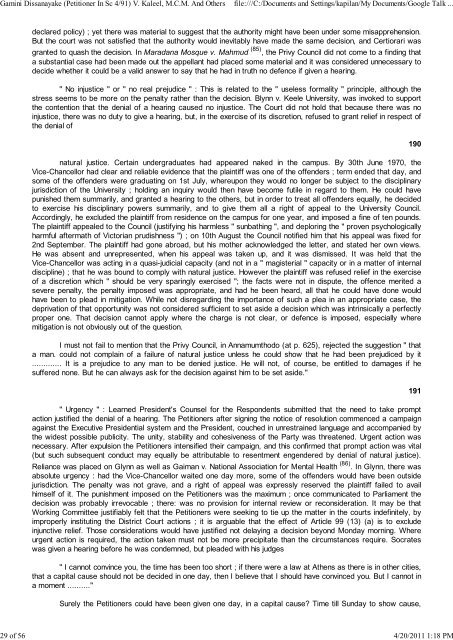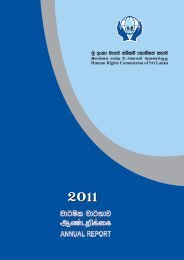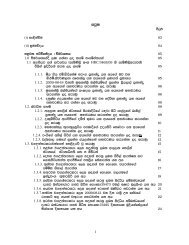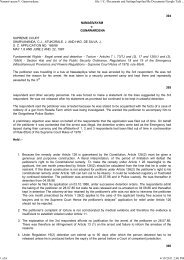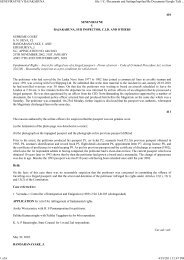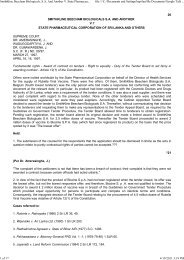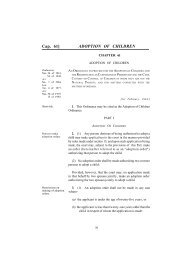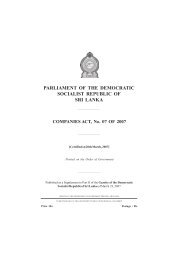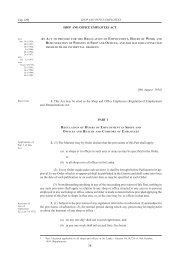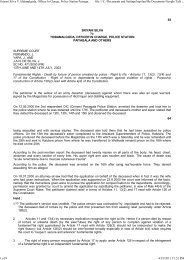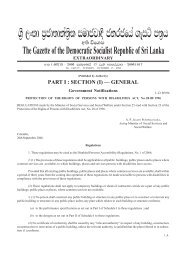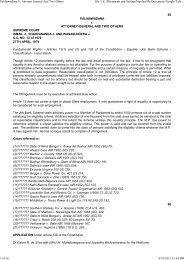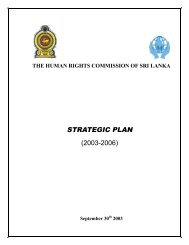Gamini Dissanayake (Petitio... - Human Rights Commission of Sri ...
Gamini Dissanayake (Petitio... - Human Rights Commission of Sri ...
Gamini Dissanayake (Petitio... - Human Rights Commission of Sri ...
You also want an ePaper? Increase the reach of your titles
YUMPU automatically turns print PDFs into web optimized ePapers that Google loves.
<strong>Gamini</strong> <strong>Dissanayake</strong> (<strong>Petitio</strong>ner In Sc 4/91) V. Kaleel, M.C.M. And Others file:///C:/Documents and Settings/kapilan/My Documents/Google Talk ...<br />
declared policy) ; yet there was material to suggest that the authority might have been under some misapprehension.<br />
But the court was not satisfied that the authority would inevitably have made the same decision, and Certiorari was<br />
granted to quash the decision. In Maradana Mosque v. Mahmud (85) , the Privy Council did not come to a finding that<br />
a substantial case had been made out the appellant had placed some material and it was considered unnecessary to<br />
decide whether it could be a valid answer to say that he had in truth no defence if given a hearing.<br />
" No injustice " or " no real prejudice " : This is related to the " useless formality " principle, although the<br />
stress seems to be more on the penalty rather than the decision. Blynn v. Keele University, was invoked to support<br />
the contention that the denial <strong>of</strong> a hearing caused no injustice. The Court did not hold that because there was no<br />
injustice, there was no duty to give a hearing, but, in the exercise <strong>of</strong> its discretion, refused to grant relief in respect <strong>of</strong><br />
the denial <strong>of</strong><br />
natural justice. Certain undergraduates had appeared naked in the campus. By 30th June 1970, the<br />
Vice-Chancellor had clear and reliable evidence that the plaintiff was one <strong>of</strong> the <strong>of</strong>fenders ; term ended that day, and<br />
some <strong>of</strong> the <strong>of</strong>fenders were graduating on 1st July, whereupon they would no longer be subject to the disciplinary<br />
jurisdiction <strong>of</strong> the University ; holding an inquiry would then have become futile in regard to them. He could have<br />
punished them summarily, and granted a hearing to the others, but in order to treat all <strong>of</strong>fenders equally, he decided<br />
to exercise his disciplinary powers summarily, and to give them all a right <strong>of</strong> appeal to the University Council.<br />
Accordingly, he excluded the plaintiff from residence on the campus for one year, and imposed a fine <strong>of</strong> ten pounds.<br />
The plaintiff appealed to the Council (justifying his harmless " sunbathing ", and deploring the " proven psychologically<br />
harmful aftermath <strong>of</strong> Victorian prudishness ") ; on 10th August the Council notified him that his appeal was fixed for<br />
2nd September. The plaintiff had gone abroad, but his mother acknowledged the letter, and stated her own views.<br />
He was absent and unrepresented, when his appeal was taken up, and it was dismissed. It was held that the<br />
Vice-Chancellor was acting in a quasi-judicial capacity (and not in a " magisterial " capacity or in a matter <strong>of</strong> internal<br />
discipline) ; that he was bound to comply with natural justice. However the plaintiff was refused relief in the exercise<br />
<strong>of</strong> a discretion which " should be very sparingly exercised "; the facts were not in dispute, the <strong>of</strong>fence merited a<br />
severe penalty, the penalty imposed was appropriate, and had he been heard, all that he could have done would<br />
have been to plead in mitigation. While not disregarding the importance <strong>of</strong> such a plea in an appropriate case, the<br />
deprivation <strong>of</strong> that opportunity was not considered sufficient to set aside a decision which was intrinsically a perfectly<br />
proper one. That decision cannot apply where the charge is not clear, or defence is imposed, especially where<br />
mitigation is not obviously out <strong>of</strong> the question.<br />
I must not fail to mention that the Privy Council, in Annamumthodo (at p. 625), rejected the suggestion " that<br />
a man. could not complain <strong>of</strong> a failure <strong>of</strong> natural justice unless he could show that he had been prejudiced by it<br />
............. It is a prejudice to any man to be denied justice. He will not, <strong>of</strong> course, be entitled to damages if he<br />
suffered none. But he can always ask for the decision against him to be set aside."<br />
" Urgency " : Learned President's Counsel for the Respondents submitted that the need to take prompt<br />
action justified the denial <strong>of</strong> a hearing. The <strong>Petitio</strong>ners after signing the notice <strong>of</strong> resolution commenced a campaign<br />
against the Executive Presidential system and the President, couched in unrestrained language and accompanied by<br />
the widest possible publicity. The unity, stability and cohesiveness <strong>of</strong> the Party was threatened. Urgent action was<br />
necessary. After expulsion the <strong>Petitio</strong>ners intensified their campaign, and this confirmed that prompt action was vital<br />
(but such subsequent conduct may equally be attributable to resentment engendered by denial <strong>of</strong> natural justice).<br />
Reliance was placed on Glynn as well as Gaiman v. National Association for Mental Health (86) . In Glynn, there was<br />
absolute urgency : had the Vice-Chancellor waited one day more, some <strong>of</strong> the <strong>of</strong>fenders would have been outside<br />
jurisdiction. The penalty was not grave, and a right <strong>of</strong> appeal was expressly reserved the plaintiff failed to avail<br />
himself <strong>of</strong> it. The punishment imposed on the <strong>Petitio</strong>ners was the maximum ; once communicated to Parliament the<br />
decision was probably irrevocable ; there: was no provision for internal review or reconsideration. It may be that<br />
Working Committee justifiably felt that the <strong>Petitio</strong>ners were seeking to tie up the matter in the courts indefinitely, by<br />
improperly instituting the District Court actions ; it is arguable that the effect <strong>of</strong> Article 99 (13) (a) is to exclude<br />
injunctive relief. Those considerations would have justified not delaying a decision beyond Monday morning. Where<br />
urgent action is required, the action taken must not be more precipitate than the circumstances require. Socrates<br />
was given a hearing before he was condemned, but pleaded with his judges<br />
" I cannot convince you, the time has been too short ; if there were a law at Athens as there is in other cities,<br />
that a capital cause should not be decided in one day, then I believe that I should have convinced you. But I cannot in<br />
a moment .........."<br />
Surely the <strong>Petitio</strong>ners could have been given one day, in a capital cause? Time till Sunday to show cause,<br />
29 <strong>of</strong> 56 4/20/2011 1:18 PM<br />
190<br />
191


